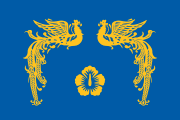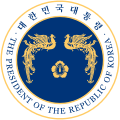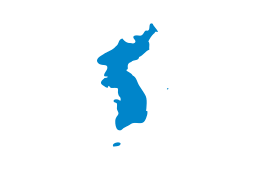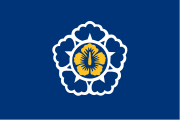Hwang Kyo-ahn
| Hwang Kyo-ahn | |
|---|---|
| 황교안 | |
 | |
| President of South Korea Acting | |
|
In office 10 March 2017 – 10 May 2017 Acting while President Park's powers and duties were suspended from 9 December 2016 to 10 March 2017 | |
| Preceded by | Park Geun-hye |
| Succeeded by | Moon Jae-in |
| 40th Prime Minister of South Korea | |
|
In office 18 June 2015 – 11 May 2017 | |
| President |
Park Geun-hye Himself (Acting) Moon Jae-in |
| Preceded by | Choi Kyoung-hwan (Acting) |
| Succeeded by | Yoo Il-ho (Acting) |
| Minister of Justice | |
|
In office 11 March 2013 – 18 June 2015 | |
| Prime Minister |
Chung Hong-won Lee Wan-koo Choi Kyoung-hwan (Acting) |
| Preceded by | Gwon Jae-jin |
| Succeeded by | Kim Ju-hyeon (Acting) |
| Personal details | |
| Born |
15 April 1957 Seoul, South Korea |
| Political party | Independent |
| Spouse(s) | Choi Ji-young |
| Children | 2 |
| Alma mater | Sungkyunkwan University |
| Korean name | |
| Hangul | 황교안 |
| Hanja | 黃敎安 |
| Revised Romanization | Hwang Gyo-an |
| McCune–Reischauer | Hwang Kyo-an |
| IPA | hoaŋ kjan |
Hwang Kyo-ahn (Korean: 황교안, Hanja: 黃敎安, RR: Hwang Gyo-an; born 15 April 1957) is a South Korean politician and lawyer and judicial branch commity and was the 40th Prime Minister of South Korea from 18 June 2015 to 11 May 2017, having previously served as Justice Minister. Hwang served as Acting President of South Korea following the impeachment and removal of President Park Geun-hye by the Constitutional Court of Korea on 10 March 2017, until the election of Moon Jae-in on 9 May 2017. He had already taken over Park's presidential powers and duties on 9 December 2016 when impeachment proceedings were launched against her by the National Assembly and she was suspended from the powers and duties of the office.[1]
Early life and education
Hwang was born on April 15, 1957.[2] He graduated from Kyunggi High School in 1976.[2] He received his LL.B in 1981 from the College of Law at Sungkyunkwan University, and passed the 23rd National Bar Exam the same year.[2]
Hwang earned his LL.M. in 2006 from the Graduate School of Law at Sungkyunkwan University.[2]
As prosecutor
Hwang was a career prosecutor.[2][3] He spent 30 years as a prosecutor, specializing "in enforcing public safety and national security laws, gaining particular expertise in legislation targeting groups linked to North Korea"—activities that prompted criticism from the South Korean opposition.[4]
Political career
Justice Minister (2013–2015)
Hwang joined the Cabinet of South Korean President Park Geun-hye in 2013 as minister of justice.[4] In that role, Hwang played a key role in the Constitutional Court case against the left-wing Unified Progressive Party (which was accused of holding pro-North Korean views); the case culminated in a controversial December 2014 order banning the party, a decision that some saw as a blow to freedom of speech in South Korea.[4][5]
Prime Minister (2015–2017)
On 21 May 2015, Park named Hwang as Prime Minister of South Korea, following the resignation of Lee Wan-koo due to allegations of bribery.[4][1][3]
In July 2016, Hwang was heckled and pelted with eggs and water bottles by crowds in the rural town of Seongju, who were opposed to deployment of the Terminal High Altitude Area Defense (a U.S. missile defense system) in the area.[6] The deployment plans angered local residents, who raised health and environmental concerns.[5][6]
Hwang "was regarded as the staunchest loyalist in Park's cabinet."[5] Nevertheless, on 2 November 2016, one month before her impeachment, Park fired Hwang as Prime Minister amid the 2016 South Korean political scandal as Park tried to rebuild confidence in her administration.[7][8] However, after "a dispute with opposition leaders over choosing a replacement," Hwang was kept in office as prime minister.[8]
Afterwards, Hwang attended the APEC meeting, which was held in Peru, on behalf of Park.
Acting President (2016–2017)
.jpg)
.jpg)
On December 9, 2016, upon National Assembly's vote to impeach President Park following a political scandal, Hwang assumed Park's presidential powers and duties as Acting President.[9] On March 10, 2017, South Korea's Constitution Court upheld the decision to impeach President Park Geun-hye, meaning Hwang will continue as Acting President of South Korea until the inauguration of the next elected President set to take place in early May.[10] On assuming the powers of the presidency, Hwang said he felt "deep responsibility".[9] The exact extent of Hwang's powers as acting president are unclear under South Korean law.[5]
His first field tour as acting president was to the Joint Chiefs of Staff in central Seoul, where he emphasized national security and stated "We are facing a grave security status, as we cannot entirely rule out the possibility of North Korean provocations near the Northern Limit Line (NLL)."[11]
Hwang decided against contesting the South Korean 2017 presidential election, declaring it would be inappropriate to run, opting instead to focus on his position as Acting President.[12][13] He was previously seen as the leading candidate for conservatives within the country, leaving them searching for a viable candidate other than Hwang to challenge leading contender Moon Jae-in for the presidency.[14]
He resigned as Prime Minister on 11 May 2017, after the election of his successor as president.[15]
References
- 1 2 "Park names Justice Minister Hwang Kyo-ahn as new PM". Yonhap. 21 May 2015. Retrieved 21 May 2015.
- 1 2 3 4 5 Minister's Profile, MOJ, Ministry of Justice, Republic of Korea (accessed December 11, 2016).
- 1 2 "South Korea's Park names new PM after scandal strikes again". Reuters. 21 May 2015.
- 1 2 3 4 Koichi Kato, Meet South Korea's new leader, Hwang Kyo-ahn: Conservative prosecutor has history of friction with opposition, The Nikkei (December 10, 2016).
- 1 2 3 4 S. Korea's interim leader was Park defender; powers unclear, Associated Press (December 9, 2016).
- 1 2 South Korean prime minister pelted with eggs by protesters, Agence France-Presse (July 15, 2016).
- ↑ Griffiths, James; Seo, Yoonjung (2 November 2016). "South Korea's prime minister sacked amid ongoing political crisis". CNN. Retrieved 2 November 2016.
- 1 2 Jonathan Cheng, South Korea President Park Geun-hye Impeached: Decision on removal will come from Constitutional Court, Wall Street Journal (December 9, 2016).
- 1 2 The latest: S. Korea PM officially becomes acting president, Associated Press (December 9, 2016).
- ↑ Hancocks, Paula; Hunt, Katie; McKirdy, Euan (2017-03-09). "South Korea: Constitutional court upholds President Park Geun-hye's impeachment". CNN. CNN. Retrieved 10 March 2017.
- ↑ Hwang visits JCS in first field tour as acting president, Yonhap News Agency (December 11, 2016).
- ↑ Sang-hun, Choe (15 March 2017). "South Korea to Elect New President in May, Government Says". Retrieved 16 May 2017 – via NYTimes.com.
- ↑ "PM not to run for presidency". 15 March 2017. Retrieved 16 May 2017.
- ↑ Sridharan, Vasudevan (15 March 2017). "South Korea's acting leader Hwang Kyo-ahn rules himself out of presidential race". Retrieved 16 May 2017.
- ↑ "694일만에 떠나는 황교안…10번째 장수총리". Retrieved 16 May 2017.
External links
| Political offices | ||
|---|---|---|
| Preceded by Choi Kyoung-hwan Acting |
Prime Minister of South Korea 2015–2017 |
Succeeded by Yoo Il-ho Acting |
| Preceded by Park Geun-hye |
President of South Korea Acting 2017 Acting for Park Geun-hye: 2016–2017 |
Succeeded by Moon Jae-in |




